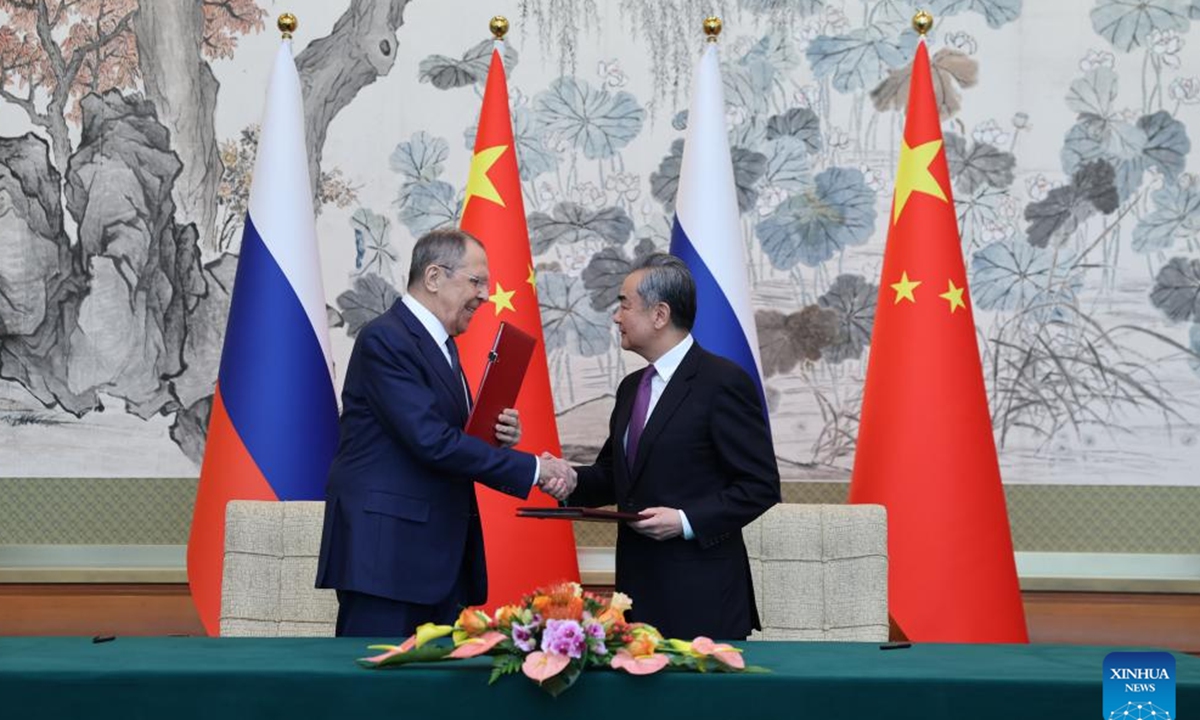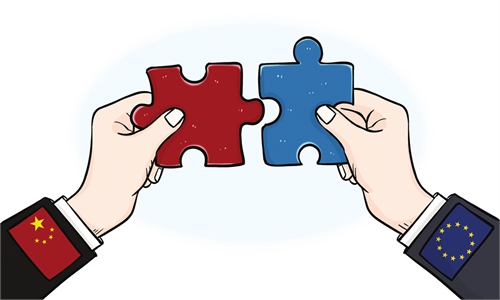China able to balance ties with Russia, US and Europe

Chinese Foreign Minister Wang Yi, also a member of the Political Bureau of the Communist Party of China Central Committee, and Minister of Foreign Affairs of the Russian Federation Sergey Lavrov sign the plan on consultation between the two foreign ministries for 2024 after their talks in Beijing, capital of China, April 9, 2024. Photo: Xinhua
Russian Foreign Minister Sergei Lavrov's visit to China coincided with the visit of US Secretary of the Treasury Janet Yellen. US Secretary of State Antony Blinken will come soon, and foreign media reported that German Chancellor Olaf Scholz and Russian President Vladimir Putin plan to visit China in succession this month and next, respectively. In other words, solid Russia-China relations are advancing in tandem with US-China and China-Europe relations. It's difficult to believe from a geopolitical point of view, but China has made it.
How important are China-Russia relations to the two countries? They couldn't be more important. After the outbreak of Russia-Ukraine conflict, the West imposed harsh sanctions on Russia. However, trade between China and Russia reached a record $240.1 billion in 2023, with China's exports to Russia growing by 46.9 percent and imports from Russia rising by 13 percent. The Russian economy actually grew by 3.6 percent in 2023, despite the war, which would have been much more difficult without the trade with China. For China, having Russia as a friendly and steadfast partner will define China's diplomatic landscape in a very different way.
Some say that China would be better off if the US replaced Russia. But due to a variety of structural reasons, especially after the US has identified China as its largest strategic competitor, Washington is seen as "unapproachable." China can only focus on easing relations with the US, but cannot make the US a partner like Russia. In fact, the "back-to-back" China-Russia relationship is precisely one of the factors that the US is wary of in its attitude toward China.
As the US and the West have labeled Russia as an "enemy" during the Ukraine war, some believe that China's most impressive diplomatic performance is maintaining close relations with Russia. However, this is wrong. The real achievement lies in China managing to maintain its relationship with Russia while also keeping overall stability in its relations with the US and Europe. China has successfully resisted pressure from the US and Europe to support sanctions against Russia, while also getting the West to consider its proposal for resolving the Russia-Ukraine conflict.
In the face of the further expanded trade between China and Russia, Washington expresses its displeasure, but it can't come up with reasons or arguments to stop the growth of trade between China and Russia. It keeps urging China not to supply Russia with arms and military materiel, keeping a close eye on China's exports to Russia, but it has never found any evidence of China supplying Russia with war materiel. The next biggest test of China-Russia relations will actually be whether China can balance China-Russia relations and China-West relations.
I am pleased to see that China's initiative to achieve this balance continues to expand as the Chinese economy keeps recovering in the post-COVID era.
First of all, Russia has a very strong desire to further strengthen relations with China and does not oppose China's development of relationship with the US and the West. Russia can indirectly benefit from China's growing economic and technological strength, and now the electronic high-tech products and the state-of-the-art equipment that Russia needs come mainly from China.
The US and Europe have adapted to China's independent policy toward Russia, and they are no longer able to exert greater pressure on China-Russia trade. Although they have called for "de-risking" from China, these calls are not aimed at the China-Russia relationship, and it is difficult to actually implement them.
According to media reports, during German Chancellor Olaf Scholz's upcoming visit to China, he will be accompanied by top German CEOs of companies, such as Mercedes-Benz and Siemens. Europe's "de-risking" from China has a different meaning than the US'. Most Europeans are not willing to see the "Atlanticism" hinder Europe-China cooperation or cooperate with the US in getting tough on China. Their demands on China usually vary based on a case-by-case basis.
Therefore, the "West" is scattered in front of China. There is a big gap between the US and Europe, with differences within Europe.
Therefore, there is a lot of room for China to deal with its relations with the US and Europe, and its relations with Russia will definitely not become a decisive obstacle.
As a major power, Europe is now feeling quite embarrassed. It is becoming hostile toward Russia, while its dependence on the US is enhancing. Europeans see their independence very highly, and China can become the leverage that supports European independence and autonomy, which is the opportunity for China to achieve a strategic balance.
Yellen smiled throughout her visit to China, as if she aimed to engage in "ping-pong diplomacy" with China. She tried to make the Chinese people feel that the sharp demands she put forward were very normal, attempting to ease the Chinese society regarding the tension in China-US relations. This is one of the signals showing that the US does not want to come to an open break with China.
In short, China is well positioned to forge strong relations with Russia, while at the same time providing effective strategic maintenance of its relationship with the US and Europe. This should be China's strategic "megaproject" in the 2020s.
The author is a Chinese media professional. opinion@globaltimes.com.cn


